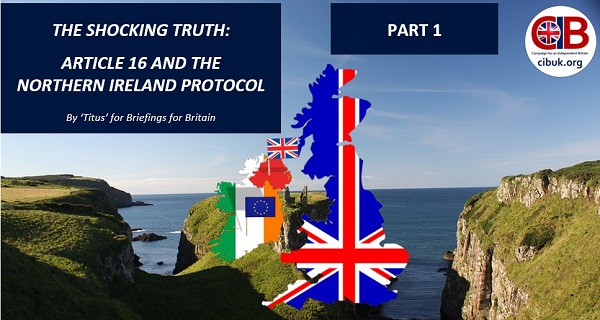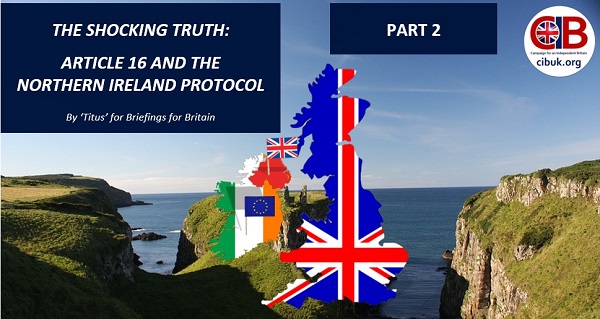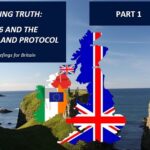The shocking truth: Article 16 and the Northern Ireland Protocol – Part one

The shocking truth: Article 16 and the Northern Ireland Protocol – Part one
By ‘Titus’ for Briefings for Britain
INTRODUCTION
We are indebted to our affiliate Briefings for Britain for exposing the reality behind the Northern Ireland Protocol in the following two articles. Here we publish Part One.
Written by ‘Titus’ – a lawyer and contributor who publishes under an assumed name – the first article is a forensic examination of the agreement itself, an orchestrated legal trap into which the UK government fell headlong and from which it is still trying to extricate itself five years later.
The second article exposes the EU’s wider political ambitions in relation to the NIP, namely to “get the United Kingdom to agree to confirm the EU’s sovereignty over Northern Irish trade on a permanent basis.”
So weighted are the terms of the NIP in favour of the EU that any agreed settlement by the UK government is – or should be – completely out of the question.
“If it wanted to compromise, the EU would start by recognising that it is exercising power in someone else’s country and that is extra-ordinary. There is no sign of that.”
While such fundamental differences remain, there can be no chance of a satisfactory agreement. On any forthcoming breakthrough we remain extremely sceptical.
Article 16: Why is it even there?
In theory, argues the author, the UK’s position regarding the Protocol should not be so dire. After all, one of the provisions of Article 16.1 allows the UK government to take unilateral action if the application of the Protocol leads to ‘diversion of trade.’
However, according to the author, the EU had no intention of honouring the terms of Article 16. And in this they had form:
“Article 16 is essentially a copy of Articles 112 and 113 of the EEA Treaty. The EU’s drafters doubtless added it because it was standard procedure. A “safeguards” provision allows the pretence that the EU is respecting the niceties of international comity such as “sovereign equality” when dealing with its neighbours. However, the EU notoriously has no time for any of its EEA partners actually invoking those provisions -and it has usually replied to attempts with disproportionate threats.”
The UK government must face a sickening but fundamental truth:
“The EU was happy to propose Article 16.1. Later, it was happy to agree the reference to “diversion of trade”, precisely because it had no intention of abiding by Article 16.1, any more than it has allowed Articles 112 and 113 of the EEA Treaty to be used in practice.”
In other words, Article 16 counts for nothing. It was a lie.
It was merely intended by the EU to call the UK’s bluff for reasons which the author exposes with brutal clarity.
The 2019 renegotiation under Boris Johnson attempted to address this problem – and the EU agreed. But even the re-negotiation counted for nothing:
“The reality is that the EU never expected the Johnson-Renegotiation to matter. When they agreed to the modest changes in the autumn of 2019, the EU had high hopes that the House of Commons would overturn Brexit.”
The General Election in 2019 put paid to that. So current negotiations weigh in the balance. On the one hand:
“the UK can only invoke Article 16 to undo the diversion of trade or serious economic (or societal or environmental) difficulties – it cannot simply be used to wish away the Protocol as a whole.”
On the other, “the EU cannot rely on the low-risk of highly theoretical problems to impose solutions that divert GB-NI trade.”
The full article can be read in the link here.
Please support our work to help to keep us going
Main image: montage © CIBUK.Org
We are grateful to our friends at Briefings for Britain for their permission to republish the following article




